Actor Profile: Bruno Ganz
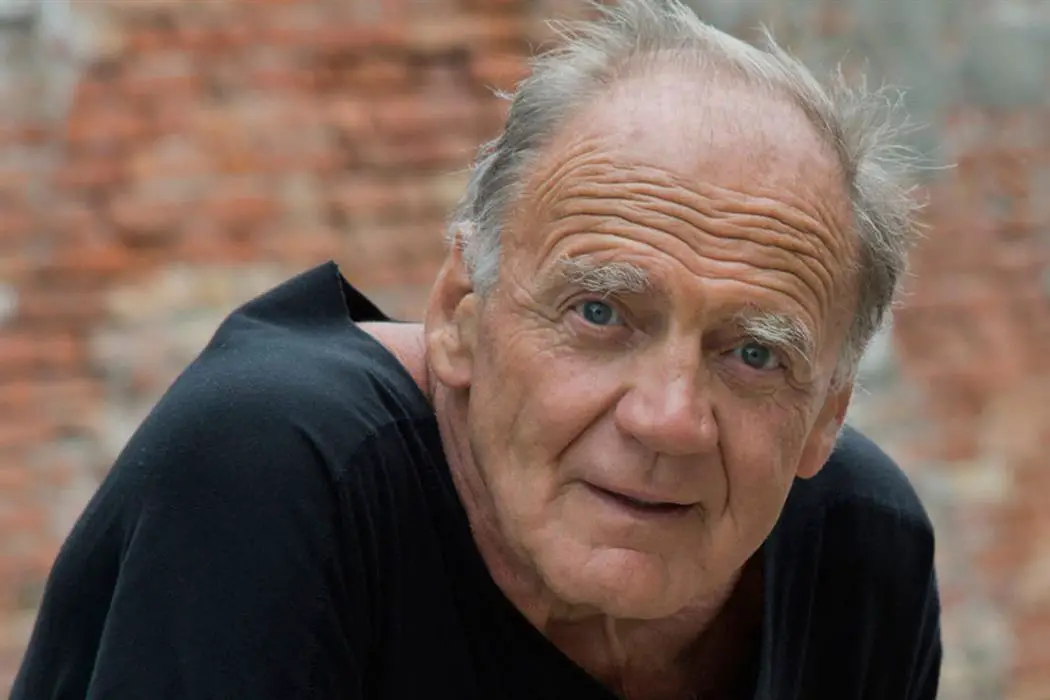
It took me a while to discover the wonderful world…
Though Bruno Ganz has many IMDb credits to his name, there’s no question that his two most famous roles are the angel Damiel in Wings of Desire, and Adolf Hitler in Downfall. An angel, and a devil. And he got rave reviews for both of them.
There are few actors working today with more range than 76-year-old Ganz. Aside from angels and devils, he’s played a suicidal Icelandic restaurateur, Jonathan Harker to Klaus Kinski‘s Count Dracula, and the antihero in a Tom Ripley adaptation. He’s starred opposite Kate Winslet, Liam Neeson and Meryl Streep. He’s been directed by Wim Wenders, Francis Ford Coppola and Ridley Scott. He’s been in German, Italian, American and Japanese movies.
His has been a truly epic career, and yet many don’t even know his name.
Early Life and Theatrical Career
Though he is best known for his German roles, Bruno Ganz was actually born in Zurich, Switzerland, to a Swiss father and an Italian mother.
Stage acting was Ganz‘s first love. After moving to Berlin, he co-founded the Schaubühne theater company with Peter Stein, who decades later would direct him in a twenty-one hour long theatrical version of Faust.
Ganz has always interspersed theatrical roles with cinematic ones. In 1996 he was given the Iffland Ring, a prize awarded since the early nineteenth century to the “most significant and most worthy actor of the German-speaking theater.”
It is largely his film roles, however, that have won him international acclaim, and in a career that’s spanned a half century, Bruno Ganz has had more than a hundred of them. Let’s take a look at some of the most notable.
The American Friend (1977, Wim Wenders)
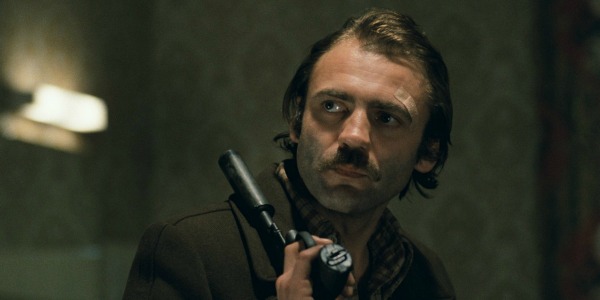
Bruno Ganz had had minor roles in TV movies since the early sixties, and had starred in Eric Rohmer‘s The Marquise of O the year before, but it was The American Friend, his first collaboration with Wim Wenders, that really drew him into the public eye. It is the second film based around the Patricia Highsmith-penned character of Tom Ripley, here played by Dennis Hopper.
Tom meets framer Jonathan Zimmerman (Ganz) at an art auction, and later suggests him when asked for a potential hitman by the charming but dangerous Raoul Minot (Gérard Blain). Jonathan has a terminal disease, and is in desperate need of money. He accepts the job offer, but as he and Tom become friends, Tom soon regrets dragging him into his life of crime.
Though Hopper had, by this point, appeared in such major films as Easy Rider, Cool Hand Luke and True Grit, comparative newcomer Ganz easily holds his own here.
It’s a meaty role, and serves as a great demo reel for much of his future work. Bruno Ganz, as Jonathan, morphs from a loving, gentle man to someone who kills seemingly without remorse. Even at his most corrupt, you are constantly rooting for him, as he’s able to evince fragility in the midst of some heinous acts. This ability to draw out vulnerability in the most unsavory of characters is a skill he’d go on to use throughout his career.
Nosferatu the Vampyre (1979, Werner Herzog)
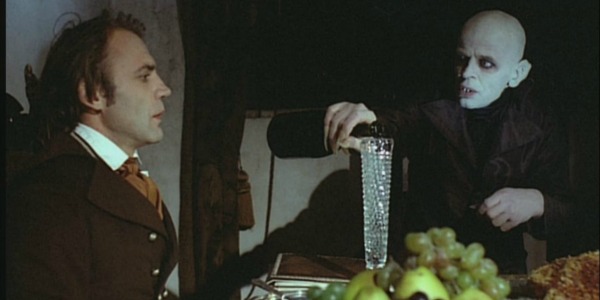
Werner Herzog‘s remake of F. W. Murnau‘s 1922 film Nosferatu. Bruno Ganz plays Jonathan Harker, a 19th century real estate agent who is tasked with negotiating a deal on a new property with the elusive Count Dracula (Klaus Kinski). He agrees to make the perilous journey to Dracula’s castle, much to the displeasure of his devoted wife Lucy (Isabelle Adjani). It’s not long before he realizes he should have listened to her.
Jonathan Harker is not Bruno Ganz‘s best performance, but he had a couple of things working against him. Firstly, Nosferatu the Vampyre was filmed in both German and English. In the English-language version, Ganz appears to struggle with the dialogue, making his performance rather stilted.
Secondly, Ganz is hopelessly overshadowed by his co-stars. Klaus Kinski‘s Count Dracula is toweringly strange, aided by a melancholy script and some creepy prosthetics (those nails!). The beautiful Isabelle Adjani fares better with the dialogue, and Lucy is an altogether more interesting role then Jonathan. Opposite Kinski and Adjani, Bruno Ganz fades into the background.
Wings of Desire (1987, Wim Wenders)
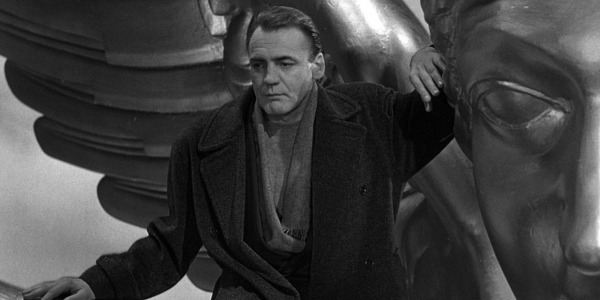
Whilst The American Friend was the film that bought Bruno Ganz his first major public exposure, his second film with Wim Wenders, ten years later, would prove to be the more famous collaboration.
Wings of Desire follows two angels, Damiel (Ganz) and Cassiel (Otto Sander), as they roam the streets of Berlin, listening to and comforting the troubled citizens, whilst remaining unseen by them. Damiel falls in love with Marion (Solveig Dommartin), a trapeze artist, and decides to make the ultimate sacrifice in becoming human so he can be with her.
Wings of Desire is one of the most exquisite films ever made. Damiel and Cassiel cut striking figures, wandering Berlin in their long black overcoats and ponytails. Peter Falk also stars in a lovely extended cameo.
Far away from the more morally grey roles he had played before, and would play after, here Ganz is a character of pure good. His kind eyes and gentle voice make him the perfect candidate to play a literal guardian angel.
Bruno Ganz, Sander, Dommartin and Falk would go on to reprise their roles in a 1993 sequel Faraway, So Close. Whilst that film doesn’t approach the wonders of Wings of Desire, it’s still an endearing watch for those eager to spend more time with these characters.
Bread and Tulips (2001, Silvio Soldini)
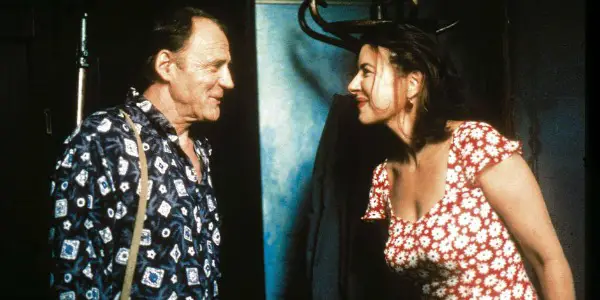
Bread and Tulips again cast Bruno Ganz as a sweet-natured soul, although this time a decidedly more terrestrial one.
Rosalba (Licia Maglietta) is on a coach tour with her family, when they leave her behind at a rest stop. She starts to hitchhike back home, but gets side-tracked and ends up in Venice. There she meets Fernando (Ganz) a charming, but suicidal Icelandic restaurateur, who shows her a great deal more kindness than she has ever received at home. Rosalba and Fernando soon become very close, but her dastardly husband is not prepared to give her up without a fight.
Bread and Tulips is one of the lighter entries in Ganz‘s filmography; he proves himself quite adept at humor of both the verbal and physical kind. Though there is an obvious layer of pathos to the lonely character of Fernando, it’s a rare joy to see Bruno Ganz in a film that is so often so silly. His final scene, accompanied by Maglietta on the accordion, is a particular treat.
Downfall (2004, Oliver Hirschbiegel)
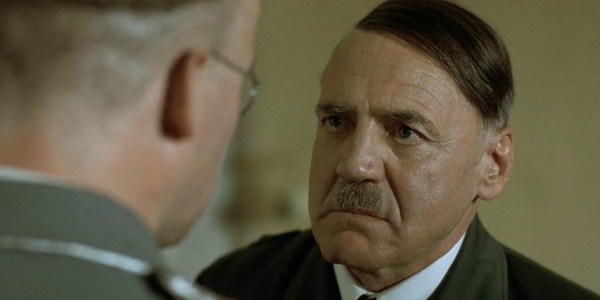
Audiences who knew Bruno Ganz only as the angel Damiel got a real shock with Oliver Hirschbiegel‘s film. But casting a man known for his portrayal of otherworldly goodness as humanity’s greatest monster turned out to be Downfall‘s genius.
The film follows the last few days in Hitler’s Berlin bunker, seen through the eyes of his personal secretary, Traudl Junge (Alexandra Maria Lara). All the big players are there: Eva Braun (Juliane Köhler), Joseph Goebbels (Ulrich Matthes), Heinrich Himmler (Ulrich Noethen) and of course Adolf Hitler (Ganz). The atmosphere in the bunker grows increasingly frenzied as it becomes clear that the days of Hitler’s evil reign are numbered.
If you type ‘Bruno Ganz’ into the YouTube search bar, seven of the first ten results are about Downfall. That film captured audiences in a way unlike any other film in Ganz‘s career, in large part due to a wildly successful meme, that allowed you to add your own subtitles to one of Hitler’s rants.
It’s a little sad that the role of Hitler has become Ganz‘s most famous character. Not that it isn’t a great performance — he delivers an unnervingly human portrayal of a man who was anything but. However, for such a varied career to be so often summarized by one silly meme is hugely unrepresentative of Bruno Ganz‘s range and talent.
Amnesia (2015, Barbet Schroeder)
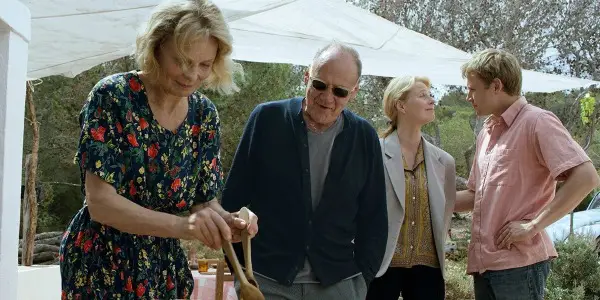
Bruno Ganz has so many screen credits to his name that logistically, he can’t have leading roles in each of them. He’s popped up for small but memorable parts in numerous films, such as The Reader and The Manchurian Candidate.
He appears for barely more than ten minutes in Barbet Schroeder‘s our review), and yet that small role leaves a mark long after he’s left the screen.
Ganz plays the unnamed grandfather to the main character Jo (Max Riemelt), a DJ who has come to Ibiza in the hope of making it big. An hour into the film, Jo’s grandfather and mother come to visit, intending on bringing him back to Germany. The three have dinner with Jo’s new friend Martha (Marthe Keller), and they get to talking about World War II.
It transpires that the grandfather had often told his family a semi-heroic story about his role in WWII, but as Martha digs into it, it seems that his story was not entirely accurate.
As his secret is revealed, you see the grandfather’s face collapse, right in front of you. It’s a devastating moment. Though what the character did was awful, as an audience you feel more sympathy for him then you do anger. It’s that same skill Bruno Ganz has been using ever since The American Friend, four decades earlier.
More to Come for Bruno Ganz
In large roles and small, in multiple languages, countries and varying types of facial hair, Bruno Ganz has been enrapturing audiences for decades. As heroes, villains, and characters who sit somewhere in between, Ganz brings an empathetic grace to every role that he plays.
He may be seventy-six years old, but the veteran actor shows no signs of slowing down. He has roles in upcoming films from both Lars von Trier and Terrence Malick, as well as in The Party, the star-packed latest feature from British director Sally Potter.
Whilst American peers like Al Pacino and Robert De Niro seem content to let their legendary earlier performances be sullied by such cinematic travesties as Jack and Jill and Dirty Grandpa, Bruno Ganz is still seeking out worthy projects on both stage and screen as he approaches his eightieth birthday. And who knows, with such interesting collaborations on the horizon, maybe the best is yet to come.
What do you think is Bruno Ganz’s best role? Have I missed out any of your favorites?
Does content like this matter to you?
Become a Member and support film journalism. Unlock access to all of Film Inquiry`s great articles. Join a community of like-minded readers who are passionate about cinema - get access to our private members Network, give back to independent filmmakers, and more.
It took me a while to discover the wonderful world of cinema, but once I did, everything just fell into place.













